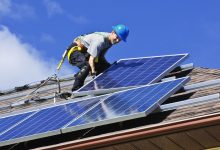The NSW Greens have unveiled a $1.25 billion plan to drive the uptake of household solar in the state, including for the hundreds of thousands of consumers traditionally locked out of the solar self-generation market.
The Greens solar plan was released on Tuesday following the rapid-fire release of rooftop solar policies from both the state Coalition government and the Labor opposition over the weekend, in the lead-up to the March election.
The NSW Greens PV policy – which the party has stressed is just one part of its soon-to-be released Roadmap to 100% Renewable Energy by 2030 – would make rooftop solar and battery storage mandatory for all new dwellings in the state.
This would ensure that the 350,000 new households expected to be built in NSW over the next four years would have, at minimum, 5kW of solar PV and 4.5kWh of battery storage – or contribute to a registered community renewable energy provider.
All new apartments and other attached dwellings would have to install at least 3kW of solar system per household, or pay $2000 to a registered community renewable energy provider
The Greens’ plan would also offer a $2,000 rebate for solar and batteries for up to 500,000 existing households with a weekly income of up to $3000/week.
Importantly, however, it would also push to extend the benefits of distributed solar to those who, for a variety of reasons, can not install their own rooftop system – a market segment all but ignored in both the Labor and Coalition policies.
To do this, the NSW Greens would make $250 million available to install solar and battery storage on all public housing buildings. The electricity produced would then be deducted from the power bills of 110,000 public housing tenants, saving them around $500/year.
For apartment owners and renters, the party would set up a community solar offset scheme.
In a state like NSW – where just under 20 per cent of all private dwelling are apartments, and where nearly a third of all households rent – the Greens estimate that a community solar offset scheme like this could give 200,000 more households to access solar over the next four years.
Finally, the NSW Greens would also push for an increase in the state feed-in tariff for solar households in the state – a mandatory extra 4.4c/kW, to account for avoided health and social costs.
”(This) plan ensures that households which have been locked out of solar power, such as apartment dwellers and renters, can support renewables and save on their electricity bills through a community solar offset scheme,” said energy spokesperson Sue Higginson in comments on Tuesday.
“We want to ensure 1 million households in NSW can either install solar panels on their home, or be part of a community solar offset scheme, within the next four years and be paid a fair price for the power they produce,” Higginson said.
“Of course increasing household solar on rooftops is like banning plastic bags – it is essential but only a small component of what is needed to fix the problem of coal fired power.
“The Greens will be announcing additional policies in coming weeks as part of our Roadmap to 100% Renewable Energy by 2030.”
As noted above, the Greens rushed out their solar policy for NSW, after the two major parties both dropped solar policies of their own over the weekend.
And while green and industry groups have welcomed the policy focus, some in the solar industry are critical of the race to subsidise residential solar, when the market is booming on its own, and when they should be focusing on incentives for battery storage, and on facilitating network and regulatory upgrades to accommodate the rapidly changing face of the grid.
“It’s vote-buying in its most blatant form,” said Huon Hoogesteger, a long-time PV industry player and founder of Smart Commercial Solar
“Currently, the industry is already maxed out. You cannot find enough installers, (and) the cost of labour has sky-rocketed (to meet demand),” Hoogesteger told RE on Tuesday.
“New (policy) ideas such as cash grabs create massive booms only absorbable by those who are prepared to negotiate on quality,” he said, raising concerns similar to those expressed by industry in Victoria, off the back of that state Labor government’s solar homes rebate.
“It’s a very blunt object, when what we need is a screw-driver, tweaking here and there and making small strategic changes to allow the market to grow,” he added.
“From my perspective, we need to be reasonable, and politically considerate of both the tax payer and the (market) stimulation, because it’s already happening, and we don’t need to be knee-jerk about it.
“We need something that we can carry forward for 20 years, instead of this rapid change and big booms and bust. We’ve suffered already from that.”








